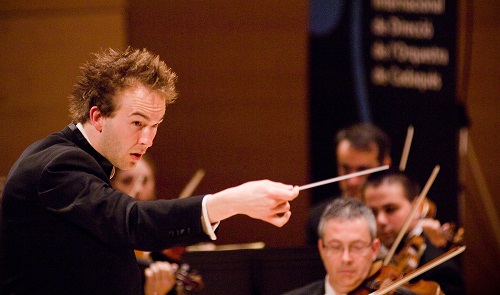 United Kingdom Copland, Britten, Tippett: Sophie Bevan (soprano), Jennifer Johnston (mezzo-soprano), Mark Padmore (tenor), Matthew Brook (bass-baritone), Hallé Choir, Hallé / Andrew Gourlay (conductor), Bridgewater Hall, Manchester, 27.10.2016. (MC)
United Kingdom Copland, Britten, Tippett: Sophie Bevan (soprano), Jennifer Johnston (mezzo-soprano), Mark Padmore (tenor), Matthew Brook (bass-baritone), Hallé Choir, Hallé / Andrew Gourlay (conductor), Bridgewater Hall, Manchester, 27.10.2016. (MC)

Copland – Fanfare for the Common Man
Britten – Sinfonia da Requiem
Tippett – A Child of Our Time
The theme of the Hallé concert was three works all written during the Second World War from the pens of Copland, Britten and Tippett. There was a slip of paper in the programmes explaining that the planned conductor Ryan Wigglesworth had to withdraw for health reasons and would be replaced by Andrew Gourlay, a former assistant conductor to Sir Mark Elder with the Hallé. The programme was still a mouth-watering prospect as the concert would be in safe hands with Gourlay, and it’s always a pleasure to hear the Hallé Choir.
Copland’s Fanfare for the Common Man is a well known work but I’m not sure I’ve ever attended the work being performed in concert. The score came about, as the USA entered the war, from commissions offered by Eugene Goossens, conductor of the Cincinnati Symphony Orchestra, for composers to write fanfares to commence his orchestral concerts. Using sixteen brass and percussion players Gourlay conducted an outstanding rendition which was only marred by the noise from latecomers being shown to their seats. Taking just over three minutes Copland has certainly written a striking and memorable score and it’s not surprising that it’s the only one of the Eugene Goossens fanfares heard today.
Making a significant impression was Britten’s Sinfonia da Requiem a work of high quality and heard far too infrequently in the concert hall. I remember my first experience of the score back in 2010 at the Philharmonie Munich with Andrew Manze conducting the Münchner Philharmoniker. The score was Britten’s response to a commission from the Japanese government as part of its planned celebrations to mark the founding of the 2,600th anniversary of the Mikado dynasty. Owing to its Christian subject matter, which Britten based around requiem mass, the commissioners rejected the score as they had been expecting something more celebratory in tone. Right from the thunderous timpani thwacks at the commencement it was impressive how Gourlay shaped his large forces with firm control. Clearly understanding the character of this dark and melancholic score he balanced the orchestral sections and individual instruments with assurance. The orchestra in the Lacrymosa maintained the funereal, unrelenting tread of the bleak lament generated in the Dies irae, a fierce reaction to the pain of grief and man’s base nature, and effectively formed the rocking rhythms of the Requiem aeternam. The orchestra communicated the predominantly dark moods and often claustrophobic feel of the writing with great skill, leaving behind at the conclusion a sense of accord and hope.
Next Tippett’s oratorio A Child of Our Time, often described as his magnum opus. Commenced in 1939 on the day war was declared on Germany and introduced in 1944 this is the response to the dreadful events which transformed the course of world history by a composer who was a confirmed pacifist. In three parts to Tippet’s own libretto the score is based around five Negro spirituals used comparably to J.S. Bach’s Lutheran chorales in the St. Matthew Passion. In a work renowned for its dense scoring Gourlay kept as firm a grip as he could on the contrasting harmonies and shifting rhythms. He produced generous quantities of internal conflict and tension to create a formidable emotional experience. Evident was the dramatic range and force of the characterful quartet of soloists who had been judiciously selected. Soprano Sophie Bevan was especially comfortable in her glorious high register and I’m not sure I’ve heard a finer tenor in oratorio than the calmly assured Mark Padmore. There was clear, well focused projection from mezzo-soprano Jennifer Johnston and as narrator bass-baritone Matthew Brook sang with impeccable phrasing and clarity of diction. One sensed the Hallé Choir – over 100 strong – relished singing Tippett’s idiosyncratic text. Trained by Matthew Hamilton the choir gave an impressively scaled and committed performance. Some of the words have a peculiar resonance today: “Away with them!… Curse them! Kill Them! … They infect the state! … We cannot have them in our empire. They shall not work nor draw a dole. Let them starve in No-Man’s-Land!” Affecting and gripping in the more dramatic sections the spirituals ‘Nobody knows the trouble I see, Lord’ and ‘Steal away’ were especially moving. The result was a performance that really did feel like an impassioned plea in music for peace against persecution and oppression.
Michael Cookson